This post contains affiliate links, and we will be compensated if you buy after clicking on our links
Show Contents
Hide Contents
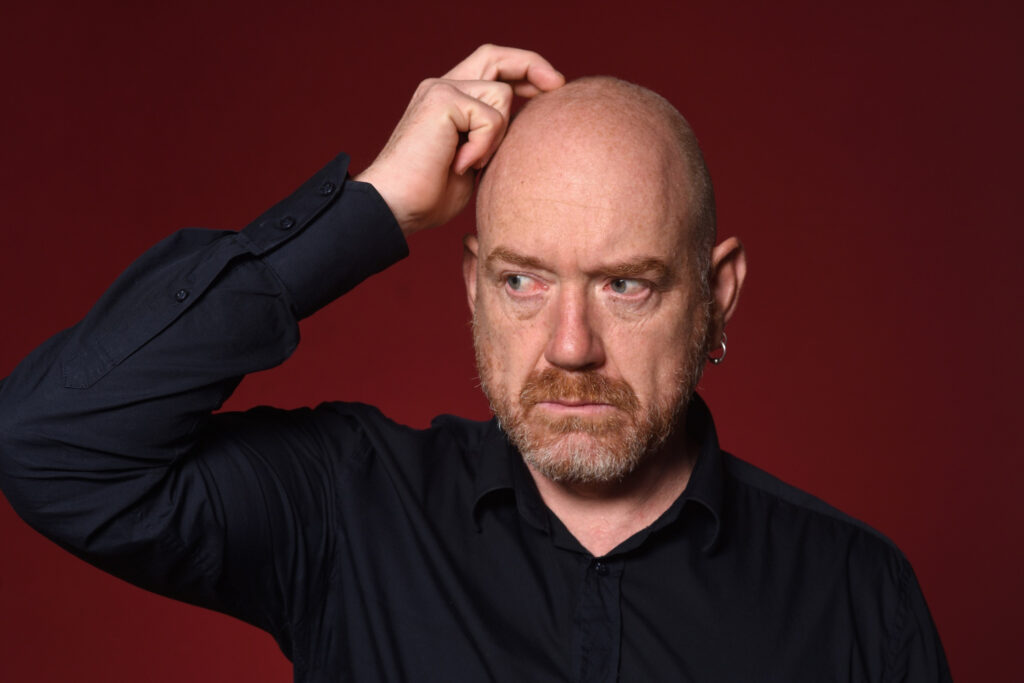 Shaved Head Dandruff
Shaved Head DandruffNo More Itching: Solutions for Shaved Head Dandruff
Do you have an itchy, flaky scalp? If so, you may have a condition known as dandruff. While dandruff can be related to various factors, finding solutions for shaved head dandruff is not always easy.
You hear it right; even people with shaved heads can also get dandruff — known as shaved head dandruff. Fortunately, several strategies can help control and even eliminate the ‘druff. The result? No more annoying, itchy feelings! Keep reading to learn more about shaved head dandruff!
What Exactly is Dandruff, and What are the Main Causes?
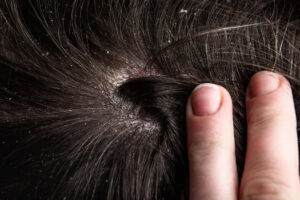 Dandruff
DandruffDandruff is a common condition that affects scalps — people of all ages can experience this.
It’s characterized by white flakes or flakes of yellow or grey skin shed from the scalp skin. This can be accompanied by irritation, itchiness, and even redness or burning in some cases.
The most common causes of dandruff include:
- Skin conditions like psoriasis and seborrheic dermatitis
- Scalp sensitivity to harsh hairstyling products
- Stress,
- Poor diet and nutrition
- Not frequently shampooing enough
- Fungal infections
- Age
While these factors can cause dandruff, it usually results from one or more of them acting alone or in combination.
What Causes Dandruff When You’re Bald?
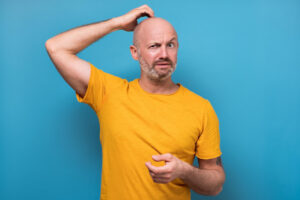 A bald head man with shaved head dandruff
A bald head man with shaved head dandruffDespite being bald, there are still specific triggers that may be more likely to cause shaved head dandruff. The major cause is dry skin, usually caused by regular shaving or clipping of the scalp.
As the razor or clipper blades drag along the scalp, they can cause tremendous stress on the sebaceous glands at the top of your head. This can often lead to skin and dead skin cells buildup drying out and flaking off, commonly resulting in sensations of itchiness and red blotches of skin.
The environment can also influence dandruff production, especially during winter months or if you live in a cold and windy region. In such cases, your scalp may dry up faster than usual, leading to temporary bouts with dandruff.
On the other hand, extreme heat or frequent exposure to sunlight may also contribute to triggering an outbreak of shaved head dandruff.
Can Shaving My Head Cause Dandruff? How Can I Avoid That?
Unfortunately, yes. Shaving your head may cause dandruff. However, you can take precautions by doing these tips before shaving your head. Check out the tips below!
Pre-shave Oil
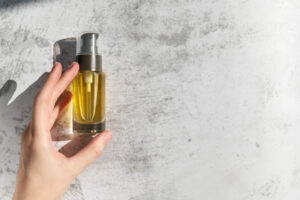 Pre-shave oil
Pre-shave oilUpgrade your shaving experience — and minimize the chance of getting shaved head dandruff — with the power of pre-shave oils.
Argan and coconut oil can help you get a smoother shave while adding moisture to your scalp. Before lathering up, rub a few drops of oil onto the skin for an improved razor glide that won’t dry out or irritate.
Coconut oil moisturizes and has natural antimicrobial properties that are perfect for preventing dandruff and buildup on both the face and head.
For an additional boost in moisture, switch to a shaving cream that contains hydrating ingredients like aloe vera or shea butter.
To keep skin clean deep down, opt for a shaving brush that will exfoliate and open pores for the closest shave possible without post-shaving weariness.
Use the Right Razor
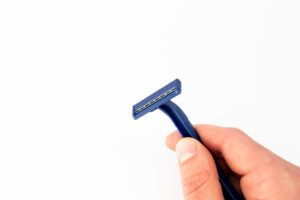 Razor
RazorA pivotal head razor is a great tool to help you get an effortless shave and ensure you won’t have shaved head dandruff. Unlike other types of razors, this type maintains contact with your skin, meaning fewer passes are required for a nail-perfect finish.
Ensuring this razor is clean and sterilized before and after every use is essential. Please do so to avoid irritation or a shaving rash.
Post-shaving Care
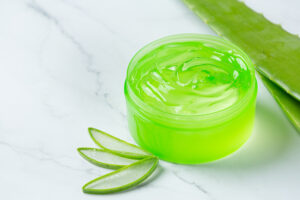 Aloe vera gel
Aloe vera gelAfter your shave, remember to lock in the moisture and keep your scalp silky smooth.
Get the most out of post-shaving care by applying an appropriate lotion full of nourishing ingredients like aloe vera or moisturizing oils.
How Can I Treat Dandruff on My Bald Head?
Protect Your Scalp from the Sun
 A man wearing a hat to protect the scalp from the sun
A man wearing a hat to protect the scalp from the sunDid you know that protecting your scalp from the sun can help treat and prevent shaved head dandruff?
Dandruff occurs when the skin of the scalp becomes dry, itchy, and irritated. Sun exposure increases this risk by drying out the scalp even more.
To protect your scalp from sun damage, always wear a hat or scarf outdoors during peak hours of sunlight (between 10 am and 4 pm).
Applying sunscreen specifically designed for your head can also help limit sun damage. When choosing a sunscreen, look for labels that mention “broad-spectrum protection” and those with an SPF of 30 or higher.
Hydrate
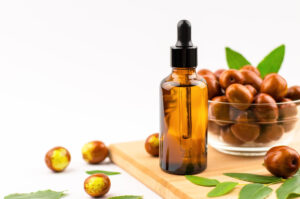 Jojoba oil
Jojoba oilKeeping your scalp hydrated is essential to treating and preventing dandruff, especially on a shaved head. When the scalp becomes dry, it can cause irritation, itching, and flaking.
To keep your scalp hydrated, make sure to drink plenty of water throughout the day, as well as use natural oils such as coconut oil or jojoba oil. These oils help to increase moisture retention and reduce inflammation.
Don’t Stop Using a Shampoo and Conditioner
 A man holding a conditioner and a shampoo
A man holding a conditioner and a shampooShampoos help remove any dirt and oil buildup on the scalp that may cause dandruff. It also prevents dead skin cells from accumulating, leading to an itchy and flaky scalp.
On the other hand, conditioner works to moisturize the scalp and replenish lost moisture in the hair shafts due to frequent shaves. This helps keep the scalp healthy and reduces dandruff-causing irritation.
When using shampoo and conditioner on a shaved head, ensure not to use products with harsh ingredients, such as sulfates or parabens. These can damage the scalp’s fragile skin, causing further dryness and irritation, thus leading to more dandruff.
Instead, opt for natural ingredients such as jojoba oil, argan oil, or aloe vera, which will help soothe irritations while maintaining a clean scalp.
Eat Right
 Healthy food
Healthy foodEating foods high in Omega 3 fatty acids, like salmon and sardines, is excellent for keeping your scalp hydrated and healthy.
Foods such as avocados which contain healthy fats, help to keep the skin on your scalp supple and plump, while vitamins A & B7 will provide nourishment.
In addition to eating nutrient-rich foods, it is also vital to avoid consuming alcohol when dealing with dandruff due to its dehydrating effects. Alcohol can worsen the condition of an already dry scalp and should be avoided as much as possible.
Oil Massage
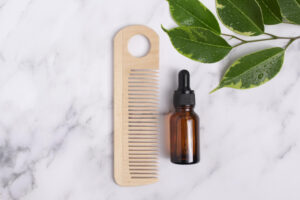 Oil Massage
Oil MassageMassaging your scalp can improve blood circulation and promote healthy hair growth. Coconut or olive oils are especially effective for treating dandruff, and you can enhance their properties by adding a few drops of essential oils such as tea tree oil.
Tea tree oil has antimicrobial and anti-inflammatory benefits when applied to the scalp, making it an excellent natural remedy for dandruff.
How to Remove Dandruff from Shaved HeadFrequently Asked Questions
Is shaving your head good for dandruff?
Some studies suggest that shaving your head can reduce the symptoms of dandruff, while others indicate no significant effects. Plus, it is essential to note that dandruff has many different causes and may require multiple treatments to find relief.
Does shaving your head make dandruff worse?
Going bald or shaving your head can cause your scalp to dry, as the process triggers an increase in evaporation from the area. This can lead to an overproduction of oil from the scalp, resulting in an unwelcome increase in dandruff.
How many times a week should I wash my hair if I have dandruff?
Washing your hair at least 2-3 times a week using a shampoo specifically designed to fight off dandruff can help reduce the symptoms of dandruff if you suffer from it.
Should you scratch dandruff before washing your hair?
Scratching dandruff off your scalp can further irritate the area, which results in a continuous cycle of itching and scratching. Additionally, the dirt you introduce when scratching can worsen dandruff.
Instead, try to balance between properly shampooing your hair and not over-washing it. This will help prevent any scalp discomfort or aggravation
What happens if you leave dandruff untreated?
If left untreated, dandruff can cause itching and discomfort to the scalp. It can also cause your scalp to produce too much skin oil, leading to clogged pores and acne in the surrounding area. Additionally, it can also affect the color of your hair, resulting in a dry and lackluster look.
Conclusion
In conclusion, maintaining a shaved head from dandruff may be tricky, but there are plenty of solutions to ensure you stay feeling and looking your best.
Choose a good shampoo designed for the scalp, protect your scalp from the sun, hydrate your scalp, eat right, do an oil massage, and use shampoos and conditioners regularly.
Whatever you decide to do, consistency should be the critical factor in your journey toward an itch-free shaved head. Remember to pay attention to how your scalp reacts, and check in with a dermatologist should you need extra help.
Armed with all this information, you don’t have to suffer from shaved head dandruff when rocking your bald head confidently!
Every office has its clown, and for us, that’s Lyndon. As a fun-loving guy who likes to take the pressure out of tense situations, we rely on him for comedic support to get us through our hardest days. You’ll find him working on a lot of our food-related posts, from drinks to recipe tips, right on down to kitchen fixtures and kitchen gadgets. If there’s one thing we can say about him, it’s that he makes a mean chicken milanese, and he can’t sing (don’t ask him to, we beg of you). Linkedin: https://www.linkedin.com/in/lyndon-seitz-bbb09471/
View all posts